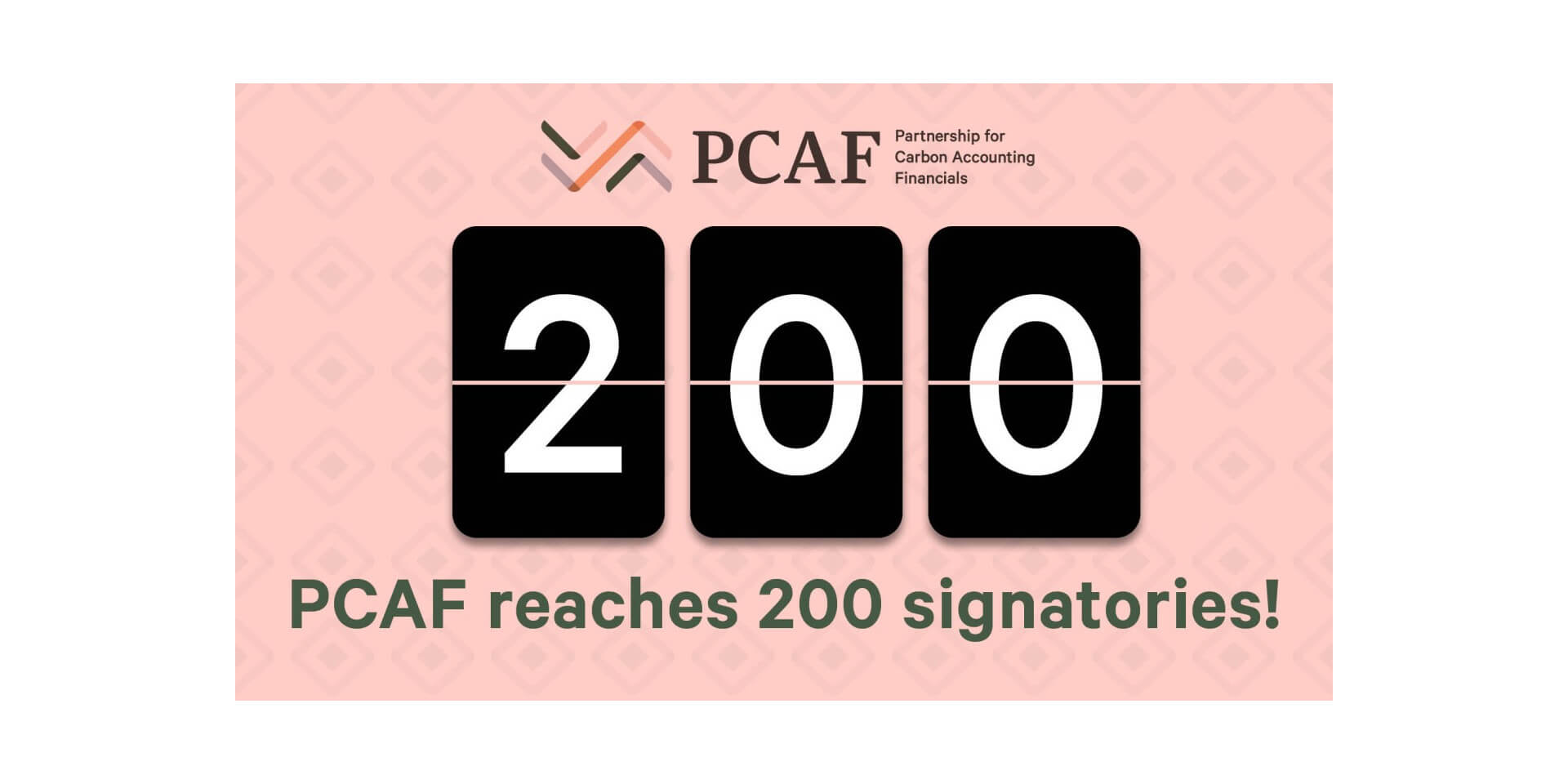
January 31, 2022 – The Partnership for Carbon Accounting Financials (PCAF) today announced that it has welcomed its 200th signatory financial institution, Japan Post Bank Co., Ltd., marking a significant milestone toward its goal of 250 signatories by year-end. Since February 2021, PCAF has doubled its number of signatories globally and nearly tripled total signatory financial assets to $60 trillion.
The rapid growth of PCAF can be attributed to the exponential adoption by financial institutions worldwide of PCAF’s Global GHG Accounting and Reporting Standard for the Financial Industry (“the Standard”). The Standard was developed to enable financial institutions to consistently measure and disclose the greenhouse gas (GHG) emissions of their loans and investments.
As the only global methodology to measure financed emissions which is built on and backed by the GHG Protocol, the Standard has become an essential part of the global climate finance ecosystem. It has drawn the interest of not only financial institutions, but also of climate finance initiatives, policymakers, and regulators. Notably, in October 2021, the Task Force for Climate-related Financial Disclosures (TCFD) published its updated implementing guidance, stating that banks, asset owners, and asset managers should measure and disclose financed emissions in alignment with the PCAF Standard.
“We launched PCAF globally in September 2019 with about 50 financial institutions and $5 trillion in assets, and are thrilled to announce that just over 2 years later, we have reached 200 financial institutions with 60 trillion USD in assets. This amazing growth clearly shows the importance of measuring and disclosing GHG emissions of financial portfolios and the value of collaboration globally and locally.”
Giel Linthorst, Executive Director of the PCAF Secretariat and Director at Guidehouse
A key driver of PCAF’s growth over the past year has been the widespread acceptance of the Standard by financial institutions in Asia-Pacific. Since January 2021, the number of PCAF signatories in region has grown nearly five-fold to 34 financial institutions representing $15 trillion in total financial assets. A third of these financial institutions are headquartered in Japan, which catalyzed the launch in November 2021 of the PCAF Japan coalition. The PCAF commitment of Japan Post Bank, one of the largest banks in Japan, is indicative of this positive regional trend and demonstrates the Japanese financial sector’s commitment to measuring and disclosing financed emissions.
"With the country’s largest financial base, Japan Post Bank recognizes that contributing to the realization of a sustainable society through investments and loans is one of its important roles. By participating in the Partnership for Carbon Accounting Financials, the Bank will improve its ability to measure and disclose details regarding the GHG emissions associated with its investments and loans, and promote efforts to achieve carbon neutrality by 2050."
Harumi Yano, Senior Managing Executive Officer of Japan Post Bank
With the rapid global adoption of the Standard, PCAF enters 2022 with the aim to continue to grow in both size and coverage of methodologies while on track to attain 250 signatories well before the end of 2022. A second edition of the PCAF Standard is due to launch in April 2022 and is expected to include GHG accounting methodologies for three new asset classes: sovereign bonds, green bonds, and emission removals. PCAF will continue to expand its horizons in the financial industry: the PCAF Insured Emissions Working Group, launched in September 2021 in collaboration with the UN-convened Net-Zero Insurance Alliance (NZIA), is developing the first global standard to measure and disclose insured emissions; in parallel, the PCAF Working Group on Capital Markets is investigating the potential of a methodology to measure and disclose facilitated emissions from capital market instruments, following the publication in November 2021 of a discussion paper on the subject.
About the Partnership for Carbon Accounting Financials
PCAF began in the Netherlands in 2015 under the leadership of ASN Bank with a handful of Dutch financial institutions, expanded to North America in 2018, and launched globally in September 2019. Currently, more than 200 financial institutions have subscribed to the PCAF initiative. PCAF signatories work together to jointly develop the Global GHG Accounting and Reporting Standard for the Financial Industry to measure and disclose the greenhouse gas emissions of their loans and investments. By doing so, PCAF signatories take an important step to assess climate-related risks, set targets in line with the Paris Climate Agreement, and develop effective strategies to decarbonize our society.
Learn more at: https://carbonaccountingfinancials.com
*** For more information, please contact:
Giel Linthorst
Executive Director, PCAF
info@carbonaccountingfinancials.com
Angélica Afanador
Program Manager & Latin America Team Lead, PCAF
info@carbonaccountingfinancials.com
For more information about Japan Post Bank, please visit:
https://www.jp-bank.japanpost.jp/en_index.html